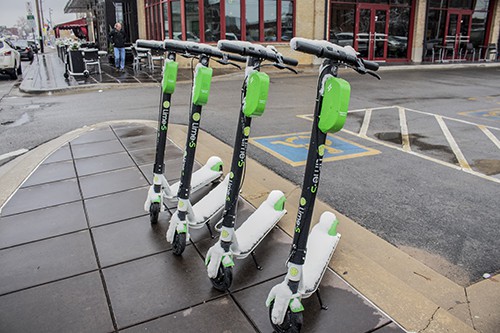
Thankfully, electric scooters haven’t become a common form of transportation in Seattle – at least not yet. But it looks like maybe the only thing stopping electric scooters from joining bicycles as a form of cheap, rentable transportation is a permit or two by the city.
If what’s happening in California is any indication, renting electric scooters to get around is an incredibly dangerous ride. In San Francisco, scooter-share companies made them available to riders without any rules or regulations in place. The result became scooters flying around on city sidewalks, riders without helmets, and all kinds of collisions happening. In fact, researchers at UCLA released a report just last month with some disturbing statistics.[1] The researchers looked at information from two different emergency departments over the course of about a year and found that 249 people needed emergency medical care from scooter collisions. One third had to be taken to the hospital in an ambulance. 74% of the injuries were from falls. 10% came from collisions with objects. 8% of the people injured were pedestrians who were hit by a scooter or tripped over one. The breakdown of injuries went like this: 40% involved head trauma, 32% involved bone fractures, with the remaining 28% involving cuts, sprains and bruises.
Not surprisingly, only 4% of injured scooter riders were wearing a helmet. This is not surprising because despite claiming a commitment to safety and public education, companies such as Bird and Lime, both of whom rent bicycles as well as scooters, don’t require helmet use. Cities like Seattle who issue permits to these companies for bicycles also haven’t required that the companies make helmets available to riders, or even require them. These scooters can reach speeds of at least 15 mph on flat surfaces – fast enough to cause serious problems for riders, pedestrians, and motor vehicle drivers.
For the time being, riders are going to have to exercise the same
common sense they would (hopefully) exercise on a privately-owned scooter, motorcycle,
or bicycle, and keep their own helmets handy. Cities and scooter-share
companies are less interested in public safety than on reducing traffic
congestion and profitability. With roughly 100 cities across the US allowing
electric scooters for rent, we’re sure to see more problems arise. In fact, it
will be interesting to see what the statistics look like when the US Centers
for Disease Control (CDC) finishes its 2019 study on electric scooter injuries,
starting in Austin, Texas.
[1] https://www.cnet.com/news/electric-scooters-lead-to-lots-of-injuries-report-says/
